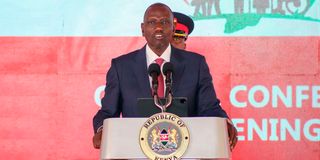Social protection is an investment in Kenya’s future

President William Ruto addresses participants during the official opening of the 2023 Social Protection Conference at the Kenya School of Government in Nairobi on April 4, 2023.
As climate extremes increase in both frequency and intensity and the world grapples with the fallout from pandemics and economic instability, the need to invest in an inclusive and robust social protection system has never been more urgent.
Social protection is a ‘shock absorber’ which cushions people from poverty, vulnerability, social exclusion and shocks such as pandemics and climate extremes. That means persons with disabilities, families with limited income opportunities or caretakers of vulnerable children or orphans can be supported with cash transfers and healthcare; children can enjoy a nutritious lunch at school; and older persons can access a pension to see them through their final years.
With their annual expenditure of trillions of dollars, national social protection systems operate at a scale and magnitude that far exceeds any international humanitarian response. Kenya spends around 1.2 per cent of its annual national budget on social protection services. By contrast, Nepal—also a lower middle-income country—plans to spend 13.7 per cent of its 2023-2024 budget on providing basic social protection services.
Kenya has made impressive progress in economic development in recent years but millions of citizens remain exposed to the uncertainties of life without adequate safety nets. The government’s development of the Social Protection Bill and a pledge to more than double the number of people benefiting from social protection from 1.2 million to 2.5 million by 2026 are, therefore, laudable.
WFP is proud to support the these efforts to provide robust and inclusive social protection services for everyone. A robust social protection system is an investment in human capital–the most valuable asset of any nation.
By channelling resources into comprehensive social safety nets, Kenya can cultivate a healthier, more skilled and more productive workforce. When people are secure in their basic needs, from food to healthcare and education, they become better equipped to contribute meaningfully to the nation’s economic growth.
Social protection acts a catalyst for entrepreneurship and economic resilience. When people are freed from the shackles of extreme poverty, they can invest in their skills and venture into entrepreneurship. This diversifies the economy and contributes to job creation and economic development.
By adopting a visionary approach that encompasses healthcare, education, targeted financial assistance and job creation for everyone, Kenya can pave the way to a brighter and more equitable future. The benefits of these investments will echo through generations, transforming Kenya into an example of progress and compassion on the African continent.
- Ms Landis is the Representative and Country Director, World Food Programme (WFP), Kenya. [email protected].




